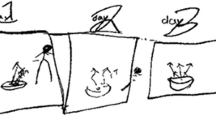Abstract
The adoption of models and modelling practices in science education is a widely accepted method. However, students’ beliefs about models deviate from the scientifically acceptable ones. This research aims to enhance students’ epistemological beliefs regarding science models by the use of a model based, inquiry Teaching Learning Sequence as an intervention method. The latter contains modelling processes and practices that incorporate Information and Communication Technologies such as applets, the Cabri Geometry II software and Phet applications. Their main common feature is the adoption of the ray model which is used for the interpretation and the prediction of light phenomena. The virtual experiments are complementary to the real ones, providing realistic representation, increased interactivity and measurability. The results indicate an increase in students’ performance in their epistemological beliefs regarding the nature, purpose, multiplicity, and change of scientific models. In addition, it is this study’s intention to unveil the criteria by which students distinguish and categorize images representing obvious models from non-obvious ones, as well as from non-science representations.
Access this chapter
Tax calculation will be finalised at checkout
Purchases are for personal use only
Similar content being viewed by others
References
Bending Light, simulation from Phet Website supported by the University of Colorado Boulder, USA. https://phet.colorado.edu/en/simulation/bending-light. Accessed 01 OCt 2016
Crawford, B., Cullin, M.: Dynamic assessments of preservice teachers’ knowledge of models and modelling. In: Boersma, K., Goedhart, M., de Jong, O., Eijkelhof, H. (eds.) Research and the Quality of Science Education, pp. 309–323. Springer, Netherlands, Dordrecht (2005)
Grosslight, L., Unger, C., Jay, E., Smith, C.L.: Understanding models and their use in science: conceptions of middle and high school students and experts. J. Res. Sci. Teach. 28(9), 799–822 (1991)
Lombardi, S., Monroy, G., Testa, I., Sassi, E.: Measuring variable refractive indices using digital photos. Phys. Educ. 45(1), 83–92 (2010)
Olympiou, G., Zacharia, Z., de Jong, T.: Making the invisible visible: enhancing students’ conceptual understanding by introducing representations of abstract objects in a simulation. Instr. Sci. 41, 575–596 (2012)
Petridou, E., Psillos, D., Hatzikraniotis, E., Viiri, J.: Design and development of a microscopic model for polarization. Phys. Educ. 44(6), 589–598 (2009)
Quintana, C., Zhang, M., Krajcik, J.: A framework for supporting metacognitive aspects of online inquiry through software-based scaffolding. Edu. Psychol. 40(4), 235–244 (2005)
Ruten, N., van Joolingen, W.R., van der Veen, J.T.: The learning effects of computer simulations in science education. Comput. Educ. 58, 136–153 (2012)
Soulios, I., Psillos, D.: Enhancing student teachers’ epistemological beliefs about models and conceptual understanding through a model-based inquiry process. Int. J. Sci. Edu. 38(7), 1212–1233 (2016)
Soulios, I.: Development and study of a model-based inquiry teaching learning sequence on the optical properties of materials (Unpublished Doctoral dissertation), Aristotle University of Thessaloniki, Thessaloniki, Greece (2012)
Taramopoulos, A., Psillos, D.: Complex phenomena understanding in electricity through dynamically linked concrete and abstract representations: complex phenomena understanding. J. Comput. Assist. Learn. 33(2), 151–163 (2017)
Taramopoulos, A., Psillos, D., Hatzikraniotis, E.: Teaching by inquiry electric circuits in virtual and real laboratory environments. In: Jimoyiannis, A. (ed.) Research on E-learning and ICT in Education: Technological, Pedagogical and Instructional Issues, pp. 209–222. Springer, New York (2011)
Testa, I., Lombardi, S., Monroy, G., Sassi, E.: An innovative context-based module to introduce students to the optical properties of materials. Phys. Educ. 46(2), 167–177 (2011)
Treagust, D.F., Chittleborough, G., Mamiala, T.L.: Students’ understanding of the role of scientific models in learning science. Int. J. Sci. Edu. 24(4), 357–368 (2002)
Windschitl, M., Thompson, J.: Transcending simple forms of school science investigation: the impact of preservice instruction on teachers’ understandings of model-based inquiry. Am. Educ. Res. J. 43(4), 783–835 (2006)
Windschitl, Mark, Thompson, J., Braaten, M.: Beyond the scientific method: model-based inquiry as a new paradigm of preference for school science investigations. Sci. Edu. 92(5), 941–967 (2008)
Acknowledgments
The authors would like to thank Dr. E. Petridou and Dr. I. Soulios for their constructive comments regarding the closed-ended questionnaire and Dr. A. Taramopoulos for his insight regarding data analysis.
Author information
Authors and Affiliations
Corresponding author
Editor information
Editors and Affiliations
Rights and permissions
Copyright information
© 2019 Springer Nature Switzerland AG
About this paper
Cite this paper
Koukioglou, S., Psillos, D. (2019). Enhancing Junior High School Students’ Epistemological Beliefs About Models in Science. In: Tsitouridou, M., A. Diniz, J., Mikropoulos, T. (eds) Technology and Innovation in Learning, Teaching and Education. TECH-EDU 2018. Communications in Computer and Information Science, vol 993. Springer, Cham. https://doi.org/10.1007/978-3-030-20954-4_35
Download citation
DOI: https://doi.org/10.1007/978-3-030-20954-4_35
Published:
Publisher Name: Springer, Cham
Print ISBN: 978-3-030-20953-7
Online ISBN: 978-3-030-20954-4
eBook Packages: Computer ScienceComputer Science (R0)




